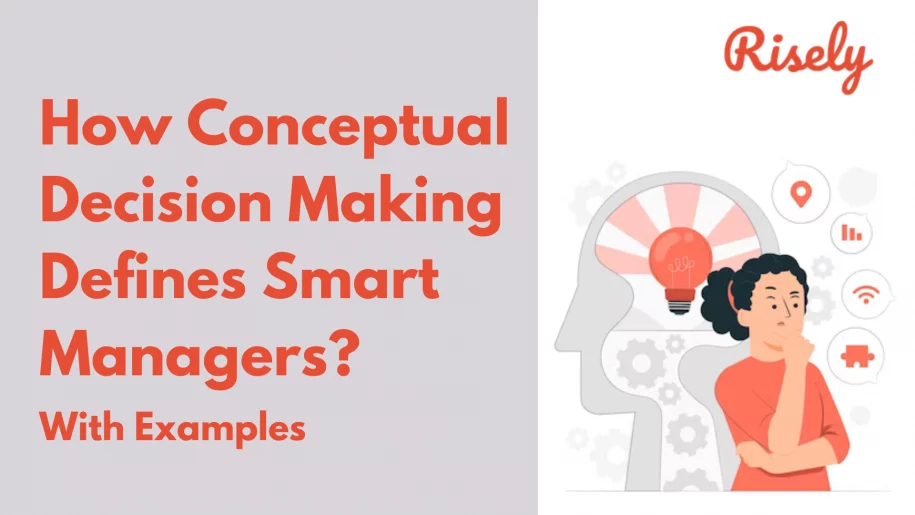How Conceptual Decision-Making Defines Smart Managers? With Examples
Managers are the decision-makers of a team. When it comes to making decisions, managers have a wide range of choices – from the strategic (making long-term decisions) to the tactical (making immediate decisions). As a result, managers need skills that enable them to make decisions in all situations. These conceptual decision-making skills are essential for managers and can help them handle ambiguity, cope with uncertainty, and solve problems. One decision-making style that is becoming more and more important for managers is the conceptual decision-making style. In this decision-making style, managers make decisions based on how these decisions align with organizational goals and strategies. This style of decision-making helps managers make faster, better decisions. It also helps them solve problems effectively by incorporating creativity into decision-making processes.What is the conceptual decision-making style?
A conceptual decision-making style is a problem-solving approach involving multiple people coming together to brainstorm potential solutions. This style of decision-making is characterized by looking at the big picture, taking into account potential future variables and opinions, and ideas. This style of decision-making can be challenging in specific scenarios, such as when there is limited time or a lack of psychological safety. However, it can lead to creative conclusions when used appropriately. An example of the conceptual decision-making style in action is when a team is brought together to brainstorm features without limitation. The group may come up with ideas that no individual could have thought of alone. The conclusions made using this style are often more creative than those made by a single individual.Example of conceptual decision-making for managers
Imagine an HR manager responsible for improving employee engagement in a company. Rather than relying on standard engagement surveys and best practices, the HR manager may use a conceptual decision-making style to develop a more innovative and tailored solution. First, the HR manager would gather information about the company’s culture, values, and current engagement levels. They would also conduct one-on-one interviews with a representative sample of employees to gain insights into their perspectives on engagement. Next, the HR manager would use their intuition and creativity to develop a unique engagement strategy tailored to the company’s culture and values. For example, they may suggest a “gamification” approach where employees earn points for completing tasks and achieving milestones, which can be redeemed for rewards and recognition. The HR manager would then evaluate the potential impact of the engagement strategy by considering its feasibility, alignment with the company’s goals and values, and potential risks and trade-offs. They would also seek input and feedback from other stakeholders, such as senior leaders and frontline managers. Finally, the HR manager would implement the engagement strategy and monitor its effectiveness over time. They would use data analytics and ongoing employee feedback to make adjustments and improvements as needed. In this example, the HR manager used a conceptual decision-making style by relying on their creativity, intuition, and strategic thinking to develop an engagement strategy tailored to the company’s culture and values. Using this approach, the HR manager created a more innovative and effective solution than traditional engagement surveys and best practices.Other Interesting Reads
Why do managers use conceptual decision-making?
Managers have used the technique of conceptual decision-making as a way of making decisions to gain a better understanding of the potential outcomes of a decision. It is a strategic style of decision-making that involves anticipating long-term consequences and risks associated with a decision. However, it is often applied in cases with multiple options, and opinions vary widely. Conceptual decision-making is based on the assumption that managers can make better decisions when they take into account future variables, such as possible scenarios, outcomes, or uncertainties – essentially, putting conceptual skills into action. In other words, it is a process of thinking ahead and drawing up an idea of high-level concepts or ideas about the future. This process helps managers evaluate different options and make decisions based on long-term objectives. The process of conceptual decision-making requires an ability to perform an analysis of situations and problems. It involves breaking down complex ideas into their parts and understanding them individually to form an idea of high-level concepts.Incorporates essential conceptual skills
Managers use conceptual skills in decision-making by understanding the different aspects of a problem and how they relate to each other. It allows them to develop a comprehensive perspective on the problem, which can help them make better decisions. Managers also use conceptual skills when thinking about ways to solve problems. By understanding the different options and their benefits, they can choose the best solution based on their values and preferences.Solves problems smartly with creativity
Managers use conceptual decision-making to solve problems creatively. It involves challenging assumptions, looking at the problem from a novel perspective, and generating possible solutions. The analytical decision-making style focuses on ambiguity and abstractions, while the transparent decision-making style encourages leaders to be open and honest about their decisions. As a result, it leads to better outcomes.Makes persuasive decisions
Managers use conceptual decision-making when considering multiple potential outcomes and making a decision that benefits them the most, and the decision-making process runs smoothly. This approach helps to weigh the pros and cons of each possible outcome, making it easier to make a persuasive decision. When making persuasive decisions, managers must consider multiple variables to identify the best choice for their situation. By considering all possible outcomes, conceptual decision-making helps managers explore all possible solutions and find the best option for their needs, gaining acceptance from the team members.Encourages collaboration
Conceptual decision-making is a style of decision-making that encourages collaboration and out-of-the-box thinking. It involves exploring multiple perspectives and weighing them against one another to reach an actionable decision. To make decisions in this style, managers must apply help and input from teams, which requires a high tolerance for ambiguity and exploration of possible outcomes. Conceptual decision-making requires managers to think critically about their decision-making process and employ multiple perspectives. One way conceptual decision-making encourages collaboration is by brainstorming meetings where teams share their ideas and the whole group votes on which idea to move forward with. By engaging with different viewpoints, conceptual decision-making allows managers to create more robust solutions to challenges faced by their organizations.Helps build long-term plans
Managers use conceptual decision-making when they engage in structured decision-making and consider the advantages, drawbacks, and potential solutions of a decision. When conceptual decision-making is used in this way, managers consider creative, innovative ways of overcoming potential obstacles and planning out the direction of a business in the coming years. This process helps build long-term plans for teams. In addition, conceptual decision-making can help decision-makers select viable options and avoid errors in the design process. By carefully weighing all of the factors and taking into account the potential risks and benefits of a decision, conceptual decision-makers can ensure that their decisions are based on sound reasoning and are likely to be successful.Conclusion
While the conceptual decision-making style may initially seem unusual, the rewards of using it are clear. Experienced conceptual decision-makers can be more creative in solving problems, making better decisions, collaborating more effectively, and planning better than less-skilled decision-makers. They process information more efficiently and quickly, making them more flexible and effective problem solvers. When a conceptual decision-making style is appropriately used, it results in intelligent decisions that are supported by sound reasoning and pragmatic plans.Do your decisions reflect your smartness?
Start the free decision-making assessment to unlock tips for smart decision-making
Other Related Blogs
10 Signs You’re Struggling with Analysis Paralysis at Work
10 Signs You’re Struggling with Analysis Paralysis at Work The smart fox declares, “I have a hundred ways to escape when trouble approaches. You have only one.” As the dogs…
Evidence Based Decision Making: 4 Proven Hacks For Managers
Evidence Based Decision Making: 4 Proven Hacks For Managers In this blog, we will explore the concept of evidence-based decision-making and provide seven proven hacks for managers to implement evidence-based…
6 Best Books On Decision Making For Managers
6 Best Books On Decision Making For Managers Effective decision-making is crucial for managers to navigate the complexities of their roles. You are responsible for making important choices that can…
Best Decision Coaches To Guide You Toward Great Choices
Best Decision Coaches To Guide You Toward Great Choices Effective decision-making is more crucial than ever in today’s rapidly evolving business landscape. Entrepreneurs, leaders, and professionals alike are constantly faced…


